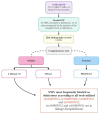NR3C1 rs6198 Variant May Be Involved in the Relationship of Graves' Disease with Stressful Events
- PMID: 37189773
- PMCID: PMC10135546
- DOI: 10.3390/biomedicines11041155
NR3C1 rs6198 Variant May Be Involved in the Relationship of Graves' Disease with Stressful Events
Abstract
Although stressful events are known to trigger Graves' disease (GD), the mechanisms involved in this process are not well understood. The NR3C1 gene, encoding for the glucocorticoid receptor (GR), presents single nucleotide polymorphisms (SNPs) that are associated with stress-related diseases. To investigate the relationship between NR3C1 SNPs, GD susceptibility, and clinical features, we studied 792 individuals, including 384 patients, among which 209 presented with Graves' orbitopathy (GO), and 408 paired healthy controls. Stressful life events were evaluated in a subset of 59 patients and 66 controls using the IES-R self-report questionnaire. SNPs rs104893913, rs104893909, and rs104893911 appeared at low frequencies and presented similar profiles in patients and controls. However, variant forms of rs6198 were rarer in GD patients, suggesting a protective effect. Stressful events were more common in patients than controls, and were reported to have clearly occurred immediately before the onset of GD symptoms in 23 cases. However, no association was found between these events and rs6198 genotypes or GD/GO characteristics. We suggest that the NR3C1 rs6198 polymorphism may be an important protective factor against GD, but its relationship with stressful events needs further investigation.
Keywords: Graves’ disease; pituitary–adrenal system; psychological; single nucleotide polymorphism; stress.
Conflict of interest statement
All authors declare that the research was carried out in the absence of any commercial or financial relationships that could be interpreted as potential conflicts of interest.
Figures
References
LinkOut - more resources
Full Text Sources


